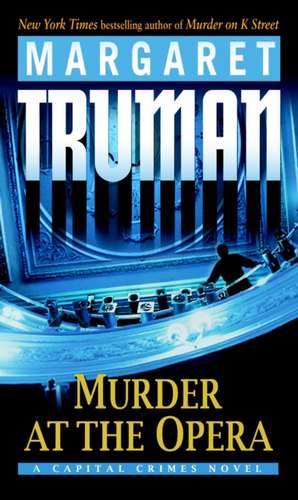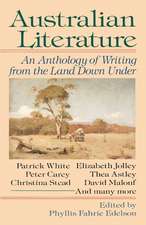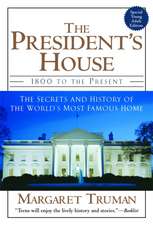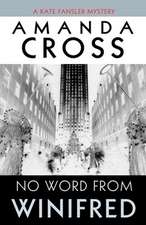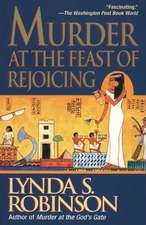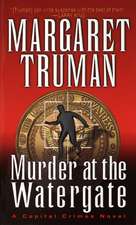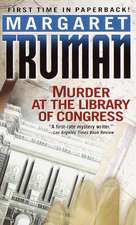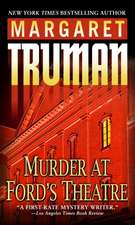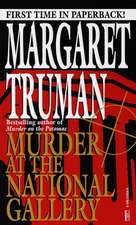Murder at the Opera: Capital Crimes (Paperback)
Autor Margaret Trumanen Limba Engleză Paperback – 30 sep 2007
It ain’t over till the fat lady sings . . . but the show hasn’t even started yet when a diva is found dead. The soprano in question, a petite young Asian Canadian named Charise Lee, was scarcely a star at the Washington National Opera. But when the aspiring singer is stabbed in the heart backstage during rehearsals, she suddenly takes center stage.
Georgetown law professor Mac Smith thought he’d just be carrying a rapier in Tosca as a favor for his beloved Annabel, but now they’re both being pressured by the panicked theater board to unmask a killer. Providing accompaniment will be former homicide detective, current P.I., and eternal opera fan Raymond Pawkins.
Soon the Smiths find themselves dangerously improvising among an expanding cast of suspects with all sorts of scores to settle. What they uncover is an increasingly complex case reaching far beyond Washington to a dark world of informers and terror alerts in Iraq, and climaxing on a fateful night at the opera attended by none other than the President himself.
From the Hardcover edition.
Preț: 49.52 lei
Nou
Puncte Express: 74
Preț estimativ în valută:
9.48€ • 9.92$ • 7.89£
9.48€ • 9.92$ • 7.89£
Carte disponibilă
Livrare economică 10-24 martie
Preluare comenzi: 021 569.72.76
Specificații
ISBN-13: 9780345478221
ISBN-10: 0345478223
Pagini: 381
Dimensiuni: 122 x 176 x 27 mm
Greutate: 0.2 kg
Editura: BALLANTINE BOOKS
Seria Capital Crimes (Paperback)
ISBN-10: 0345478223
Pagini: 381
Dimensiuni: 122 x 176 x 27 mm
Greutate: 0.2 kg
Editura: BALLANTINE BOOKS
Seria Capital Crimes (Paperback)
Notă biografică
Margaret Truman won faithful readers with her works of biography and fiction, particularly her ongoing series of Capital Crimes mysteries. Her novels let us into the corridors of power and privilege, and poverty and pageantry, in the nation’s capital. She was the author of many nonfiction books, including The President’s House, in which she shares some of the secrets and history of the White House where she once resided. She lived in Manhattan and passed away in 2008.
From the Hardcover edition.
From the Hardcover edition.
Extras
ONE
“Mac, you must do it.” “No.” “It’s an honor, for you and for the school.”
“I don’t see anything honorable about middle-aged men dressed in loincloths strutting around carrying spears. I thought we’d progressed beyond that.”
Annabel knew her husband wouldn’t be an easy sell. But his flippant comment meant she was making progress. There would be an obligatory protest before caving in.
“I’m not an actor,” he added.
They’d finished breakfast and had taken refilled mugs of coffee out onto the balcony of their Watergate apartment. It was a warm, muggy morning in early June, a harbinger of another sweltering summer in D.C. The sky was a milky blue. Below, the rippling waters of a cleaner Potomac River danced in the sunlight. Farther up the river, the familiar spires of Georgetown University rose proudly into the air.
“Of course you’re an actor,” Annabel said. “You can’t be a high-powered trial lawyer without being an actor. I saw you in action when you were trying cases. You were Olivier in a gray three-piece suit.”
“That was then,” he said. “Today I am just a stodgy professor, and happy to be.”
She considered her next argument. She’d practiced her own share of theatrics while representing clients in high-profile domestic disputes. That was then, too. She’d given up matrimonial law to open a pre-Colombian art gallery in Georgetown, which was doing nicely. Giving up their respective law practices had been a decision they’d come to at different times, and for different reasons.
For Annabel, attempting to mediate wrenching battles between warring spouses had become almost unbearable, especially when both sides were engaged in self-destructive behavior, domestic suicide bombers intent on injuring each other.
For him, the death of his first wife and only child at the hands of a drunken driver on the Beltway one rainy night had tipped the scales in favor of his escaping what had become one of Washington’s preemi- nent criminal law firms, abandoning it to his three partners, and becoming Mackensie Smith, professor of law at the prestigious George Washington University.
Neither Mac nor Annabel had regretted their decisions, not even fleetingly.
“Mac,” she said softly, touching his arm, “using prominent people as supernumeraries in productions has gotten the opera lots of good press, which translates into ticket sales. You’ll be in good company. Last year, two spear-toting Supreme Court justices wore costumes in a production. You read about them in the Post. And the Secretary of State and his wife did, too, the season before. This time it’s professors from the area’s universities. Besides, it’s Tosca, Mac. Puccini. You’ll love it.”
“You know I’m not an opera fan,” he said.
“But you’ll become one. I guarantee it. Tosca is the perfect intro for you. It has all the elements of great drama—sex, betrayal, corruption, and murder—and gorgeous music.” She checked his expression. She almost had him. Time to go in for the kill. “Besides,” she said, “I’ve already committed you.” Before he could respond, she added, “It’s important to me, Mac. I’m new on the board and want to make what contributions I can as quickly as possible.”
He grinned. “And your first contribution is to sacrifice me?”
“You’ll do it?”
“Sure. Anything for a good cause.”
“The National Opera is a good cause,” she said.
“I was thinking of you, Annie. You’re the best cause I know.”
He got up from the table, kissed her on the cheek, and headed inside, saying over his shoulder, “I’m running late for a faculty meeting. Busy day.”
“Leave time for your fitting,” she said, following him.
He stopped, turned, and said, “Costume fitting? My loincloth?”
“Yes. And stop saying it’s a loincloth. It’s not.”
“When?”
“This afternoon. I told Harriet you’d be free after four.”
“Where?”
“Takoma Park, the company’s rehearsal facility. All the costumes are done there. Oh, and there’s a meeting of supers tonight at the Kennedy Center. Seven o’clock. I’ll go with you.”
He embraced her, kissed her again, this time meaningfully, picked up his briefcase, and stepped into the hall. She stood in the open doorway admiring his purposeful stride in the direction of the ele- vators. He was halfway there when he suddenly stopped, turned, pointed a finger at her, and said, “You owe me one, Annie.”
“Oh? When?”
“I’ll collect tonight. And it will be more than just a rehearsal.”
She giggled, and said just loud enough for him to hear but not the neighbors, “I love it when you talk dirty.”
TWO
Mac Smith sometimes thought that if he were president of the university, he would ban all faculty meetings. Occasionally, a meeting went smoothly, accomplished something, and consumed a minimal amount of time, but that was the twice-a-year exception rather than the rule. It all depended, of course, on who chaired the meeting. This day it was the new dean of the law school, a nice enough fellow with impressive credentials—and a tendency to posture. Had there been a fireplace in the room, Mac was certain that the dean would lean an elbow on the mantel and smoke a pipe, allowing for photographs, had smoking been allowed.
The meeting lasted forty-five minutes, thirty-one minutes longer than was necessary to cover the agenda. Mac was first out the door, closely followed by John Renwick, a teaching colleague who shared Mac’s abhorrence of wasted time. Renwick came into Mac’s office, tossed his briefcase on a small couch, and said, “Did anything useful come out of this, or did I miss something?”
Mac laughed as he opened the drapes that covered his only window and raised the blinds. “Scuzzy day out there,” he said. He turned to face Renwick. “We just learned from our new leader,” he said, “that someone on Capitol Hill, obviously of the right-wing variety, is considering convening a committee to investigate whether young attorneys being turned out by esteemed institutions like ours need a better grounding in old-fashioned legal principles; translation, more conservative ones. Our leader wants to be on the record as having heeded the call and explored with his faculty this alleged problem—which, of course, isn’t a problem. What’s new with you?”
“Not a lot. Lois wonders whether you and Annabel are free tonight for dinner, a last-minute thing. A college buddy of mine and his wife blew into town, also last-minute. Haven’t seen him in years. You’d enjoy him. He’s—”
“No can do,” Mac said, “but thanks anyway. Prior engagement. I’m being fitted for a loincloth.”
“What?”
“Annabel has ensnared me in this opera project cooked up by Public Affairs. I’m going to be an extra in Tosca.”
“I think that’s wonderful,” said Renwick, mirth in his voice. “You do have good legs.”
“I suggest you leave it right there, my friend.”
“I envy you,” Renwick said. “I love opera. You’ll be in heady company, Mac. Our leader is donning a loincloth, too, isn’t he?”
“So I hear.”
“Well,” said Renwick, retrieving his briefcase, “good luck. By the way, you won’t be an ‘extra’ in the cast. Extras in opera are called ‘supers’—supernumeraries—supernumerárius in Latin.”
“I know, but I prefer plain old ‘extra,’ for the same reason I refuse to play that pretentious game at Starbucks of calling a medium-size coffee a grande. I always ask for a medium coffee when I go there, which isn’t often. I make better coffee than they do and it doesn’t cost me the month’s mortgage.”
“We have to make our stands where we find them,” Renwick said, laughing and shaking his head. “I was a spear carrier in an opera while working my way through college. Aida. Loved it. Sorry you can’t make dinner. Another time. Give my best to Annabel.” He left the office, closing the door behind him.
Mac spent the next few hours fine-tuning a lecture on habeas corpus he would deliver that afternoon, taking a break from time to time to think about less solemn subjects, namely Annabel, dear sweet Annabel, who’d entered his life a year after having lost his wife and son and giving him a reason to live again. That she was a beautiful woman was beyond debate, hair the color of Titian copper, fair unblemished skin, and a figure that was at once sleek and voluptuous. He needed only to look at her in dark moments to feel his emotional tide rise. Wrapped in that package was a vigorous, surprisingly poetic mind (for a lawyer) that was seldom swayed by trivial or self-serving manipulations. That she’d readily agreed to make him her first and only husband awed him at times. Sometimes you do, indeed, get lucky.
Although they’d structured their married life to maximize time alone together, they were wise enough to know that too much togetherness could prove to be detrimental, and so they pursued the things they loved aside from each other, she her gallery and participation in a few selected arts institutions, he his tennis matches despite an increasingly bothersome knee, consulting commitments to an occasional government agency, and a twice-a-month poker game.
-
The Washington National Opera was Annabel’s latest involvement. A couple with whom they were friendly—husband and wife both ardent opera lovers—had tried to entice Mac and Annabel into buying season tickets at the Kennedy Center. As much as Annabel would have enjoyed having her husband escort her to the productions, she knew she would be unsuccessful, and contented herself with buying a single season ticket and accompanying their friends. She hadn’t been steeped in opera up until that point, and wasn’t sure she would find it as enjoyable as they did. But after that first season of five lavishly staged and magnificently performed productions, she was hooked, and not only couldn’t wait for the next season to arrive, she became active with WNO itself, contributing a substantial sum of money and becoming a member of the Medici Society, one of many organizations devoted to sustaining and enhancing the company’s financial and artistic goals. After two years of fund-raising and softly suggesting artistic visions and practical ideas to the company, she was surprised and flattered to be offered a seat on WNO’s board, which she readily accepted. At the moment, she was immersed in plans for the annual Opera Ball, one of Washington’s premiere formal fundraising events.
Mac was pleased with his wife’s commitment and offered his steady encouragement. Of course, Annabel continued to try to cajole him into becoming involved, too, but he remained steadfast: “You don’t play poker with me,” he said, “and I don’t go to the opera with you.” And thus it remained, although the number of CDs grew rapidly, and the apartment was frequently awash with classic recordings, which Mac found increasingly enjoyable, particularly the works of Mozart, Puccini, and Richard Strauss.
“You love the recorded music,” Annabel would say after he’d commented favorably on a new recording she’d brought into their home. “Why not enjoy it in person?”
“Maybe next year,” he would say.
And she would say, “You said that last year.”
-
This was this year, and he would finally be going to the opera, not in black tie but in a costume of sorts, and makeup, onstage, for the world to see, including his students, fellow faculty members, and close friends. The thought made him wince and sent him back to the more pleasant and not quite unrelated topic of habeas corpus.
From the Hardcover edition.
“Mac, you must do it.” “No.” “It’s an honor, for you and for the school.”
“I don’t see anything honorable about middle-aged men dressed in loincloths strutting around carrying spears. I thought we’d progressed beyond that.”
Annabel knew her husband wouldn’t be an easy sell. But his flippant comment meant she was making progress. There would be an obligatory protest before caving in.
“I’m not an actor,” he added.
They’d finished breakfast and had taken refilled mugs of coffee out onto the balcony of their Watergate apartment. It was a warm, muggy morning in early June, a harbinger of another sweltering summer in D.C. The sky was a milky blue. Below, the rippling waters of a cleaner Potomac River danced in the sunlight. Farther up the river, the familiar spires of Georgetown University rose proudly into the air.
“Of course you’re an actor,” Annabel said. “You can’t be a high-powered trial lawyer without being an actor. I saw you in action when you were trying cases. You were Olivier in a gray three-piece suit.”
“That was then,” he said. “Today I am just a stodgy professor, and happy to be.”
She considered her next argument. She’d practiced her own share of theatrics while representing clients in high-profile domestic disputes. That was then, too. She’d given up matrimonial law to open a pre-Colombian art gallery in Georgetown, which was doing nicely. Giving up their respective law practices had been a decision they’d come to at different times, and for different reasons.
For Annabel, attempting to mediate wrenching battles between warring spouses had become almost unbearable, especially when both sides were engaged in self-destructive behavior, domestic suicide bombers intent on injuring each other.
For him, the death of his first wife and only child at the hands of a drunken driver on the Beltway one rainy night had tipped the scales in favor of his escaping what had become one of Washington’s preemi- nent criminal law firms, abandoning it to his three partners, and becoming Mackensie Smith, professor of law at the prestigious George Washington University.
Neither Mac nor Annabel had regretted their decisions, not even fleetingly.
“Mac,” she said softly, touching his arm, “using prominent people as supernumeraries in productions has gotten the opera lots of good press, which translates into ticket sales. You’ll be in good company. Last year, two spear-toting Supreme Court justices wore costumes in a production. You read about them in the Post. And the Secretary of State and his wife did, too, the season before. This time it’s professors from the area’s universities. Besides, it’s Tosca, Mac. Puccini. You’ll love it.”
“You know I’m not an opera fan,” he said.
“But you’ll become one. I guarantee it. Tosca is the perfect intro for you. It has all the elements of great drama—sex, betrayal, corruption, and murder—and gorgeous music.” She checked his expression. She almost had him. Time to go in for the kill. “Besides,” she said, “I’ve already committed you.” Before he could respond, she added, “It’s important to me, Mac. I’m new on the board and want to make what contributions I can as quickly as possible.”
He grinned. “And your first contribution is to sacrifice me?”
“You’ll do it?”
“Sure. Anything for a good cause.”
“The National Opera is a good cause,” she said.
“I was thinking of you, Annie. You’re the best cause I know.”
He got up from the table, kissed her on the cheek, and headed inside, saying over his shoulder, “I’m running late for a faculty meeting. Busy day.”
“Leave time for your fitting,” she said, following him.
He stopped, turned, and said, “Costume fitting? My loincloth?”
“Yes. And stop saying it’s a loincloth. It’s not.”
“When?”
“This afternoon. I told Harriet you’d be free after four.”
“Where?”
“Takoma Park, the company’s rehearsal facility. All the costumes are done there. Oh, and there’s a meeting of supers tonight at the Kennedy Center. Seven o’clock. I’ll go with you.”
He embraced her, kissed her again, this time meaningfully, picked up his briefcase, and stepped into the hall. She stood in the open doorway admiring his purposeful stride in the direction of the ele- vators. He was halfway there when he suddenly stopped, turned, pointed a finger at her, and said, “You owe me one, Annie.”
“Oh? When?”
“I’ll collect tonight. And it will be more than just a rehearsal.”
She giggled, and said just loud enough for him to hear but not the neighbors, “I love it when you talk dirty.”
TWO
Mac Smith sometimes thought that if he were president of the university, he would ban all faculty meetings. Occasionally, a meeting went smoothly, accomplished something, and consumed a minimal amount of time, but that was the twice-a-year exception rather than the rule. It all depended, of course, on who chaired the meeting. This day it was the new dean of the law school, a nice enough fellow with impressive credentials—and a tendency to posture. Had there been a fireplace in the room, Mac was certain that the dean would lean an elbow on the mantel and smoke a pipe, allowing for photographs, had smoking been allowed.
The meeting lasted forty-five minutes, thirty-one minutes longer than was necessary to cover the agenda. Mac was first out the door, closely followed by John Renwick, a teaching colleague who shared Mac’s abhorrence of wasted time. Renwick came into Mac’s office, tossed his briefcase on a small couch, and said, “Did anything useful come out of this, or did I miss something?”
Mac laughed as he opened the drapes that covered his only window and raised the blinds. “Scuzzy day out there,” he said. He turned to face Renwick. “We just learned from our new leader,” he said, “that someone on Capitol Hill, obviously of the right-wing variety, is considering convening a committee to investigate whether young attorneys being turned out by esteemed institutions like ours need a better grounding in old-fashioned legal principles; translation, more conservative ones. Our leader wants to be on the record as having heeded the call and explored with his faculty this alleged problem—which, of course, isn’t a problem. What’s new with you?”
“Not a lot. Lois wonders whether you and Annabel are free tonight for dinner, a last-minute thing. A college buddy of mine and his wife blew into town, also last-minute. Haven’t seen him in years. You’d enjoy him. He’s—”
“No can do,” Mac said, “but thanks anyway. Prior engagement. I’m being fitted for a loincloth.”
“What?”
“Annabel has ensnared me in this opera project cooked up by Public Affairs. I’m going to be an extra in Tosca.”
“I think that’s wonderful,” said Renwick, mirth in his voice. “You do have good legs.”
“I suggest you leave it right there, my friend.”
“I envy you,” Renwick said. “I love opera. You’ll be in heady company, Mac. Our leader is donning a loincloth, too, isn’t he?”
“So I hear.”
“Well,” said Renwick, retrieving his briefcase, “good luck. By the way, you won’t be an ‘extra’ in the cast. Extras in opera are called ‘supers’—supernumeraries—supernumerárius in Latin.”
“I know, but I prefer plain old ‘extra,’ for the same reason I refuse to play that pretentious game at Starbucks of calling a medium-size coffee a grande. I always ask for a medium coffee when I go there, which isn’t often. I make better coffee than they do and it doesn’t cost me the month’s mortgage.”
“We have to make our stands where we find them,” Renwick said, laughing and shaking his head. “I was a spear carrier in an opera while working my way through college. Aida. Loved it. Sorry you can’t make dinner. Another time. Give my best to Annabel.” He left the office, closing the door behind him.
Mac spent the next few hours fine-tuning a lecture on habeas corpus he would deliver that afternoon, taking a break from time to time to think about less solemn subjects, namely Annabel, dear sweet Annabel, who’d entered his life a year after having lost his wife and son and giving him a reason to live again. That she was a beautiful woman was beyond debate, hair the color of Titian copper, fair unblemished skin, and a figure that was at once sleek and voluptuous. He needed only to look at her in dark moments to feel his emotional tide rise. Wrapped in that package was a vigorous, surprisingly poetic mind (for a lawyer) that was seldom swayed by trivial or self-serving manipulations. That she’d readily agreed to make him her first and only husband awed him at times. Sometimes you do, indeed, get lucky.
Although they’d structured their married life to maximize time alone together, they were wise enough to know that too much togetherness could prove to be detrimental, and so they pursued the things they loved aside from each other, she her gallery and participation in a few selected arts institutions, he his tennis matches despite an increasingly bothersome knee, consulting commitments to an occasional government agency, and a twice-a-month poker game.
-
The Washington National Opera was Annabel’s latest involvement. A couple with whom they were friendly—husband and wife both ardent opera lovers—had tried to entice Mac and Annabel into buying season tickets at the Kennedy Center. As much as Annabel would have enjoyed having her husband escort her to the productions, she knew she would be unsuccessful, and contented herself with buying a single season ticket and accompanying their friends. She hadn’t been steeped in opera up until that point, and wasn’t sure she would find it as enjoyable as they did. But after that first season of five lavishly staged and magnificently performed productions, she was hooked, and not only couldn’t wait for the next season to arrive, she became active with WNO itself, contributing a substantial sum of money and becoming a member of the Medici Society, one of many organizations devoted to sustaining and enhancing the company’s financial and artistic goals. After two years of fund-raising and softly suggesting artistic visions and practical ideas to the company, she was surprised and flattered to be offered a seat on WNO’s board, which she readily accepted. At the moment, she was immersed in plans for the annual Opera Ball, one of Washington’s premiere formal fundraising events.
Mac was pleased with his wife’s commitment and offered his steady encouragement. Of course, Annabel continued to try to cajole him into becoming involved, too, but he remained steadfast: “You don’t play poker with me,” he said, “and I don’t go to the opera with you.” And thus it remained, although the number of CDs grew rapidly, and the apartment was frequently awash with classic recordings, which Mac found increasingly enjoyable, particularly the works of Mozart, Puccini, and Richard Strauss.
“You love the recorded music,” Annabel would say after he’d commented favorably on a new recording she’d brought into their home. “Why not enjoy it in person?”
“Maybe next year,” he would say.
And she would say, “You said that last year.”
-
This was this year, and he would finally be going to the opera, not in black tie but in a costume of sorts, and makeup, onstage, for the world to see, including his students, fellow faculty members, and close friends. The thought made him wince and sent him back to the more pleasant and not quite unrelated topic of habeas corpus.
From the Hardcover edition.
Recenzii
Praise for Margaret Truman
“Truman ‘knows the forks’ in the nation’s capital and how to pitchfork her readers into a web of murder and detection.”
–The Christian Science Monitor
Murder at The Washington Tribune
“Hooks the reader immediately.”
–The Oklahoman
Murder at Union Station
“Truman has produced another knowing look at Washington politics. She, of all people, should know her characters well, and she draws them with style.”
–The Dallas Morning News
Murder at Ford’s Theatre
“Dead-on descriptions of Washington’s most crack-ridden streets and exclusionary shindigs . . . Readers who enjoy travelogue, gossip, and social commentary in their whodunits will enjoy Murder at Ford’s Theatre.”
–USA Today
From the Hardcover edition.
“Truman ‘knows the forks’ in the nation’s capital and how to pitchfork her readers into a web of murder and detection.”
–The Christian Science Monitor
Murder at The Washington Tribune
“Hooks the reader immediately.”
–The Oklahoman
Murder at Union Station
“Truman has produced another knowing look at Washington politics. She, of all people, should know her characters well, and she draws them with style.”
–The Dallas Morning News
Murder at Ford’s Theatre
“Dead-on descriptions of Washington’s most crack-ridden streets and exclusionary shindigs . . . Readers who enjoy travelogue, gossip, and social commentary in their whodunits will enjoy Murder at Ford’s Theatre.”
–USA Today
From the Hardcover edition.
Descriere
When a young soprano is found murdered, life imitates opera, and suddenly all the performers seem to have something to hide The murder investigation is in a race against time mere weeks before opening night, a black-tie gala at which everyone--including the President himself--will be in the seats.
